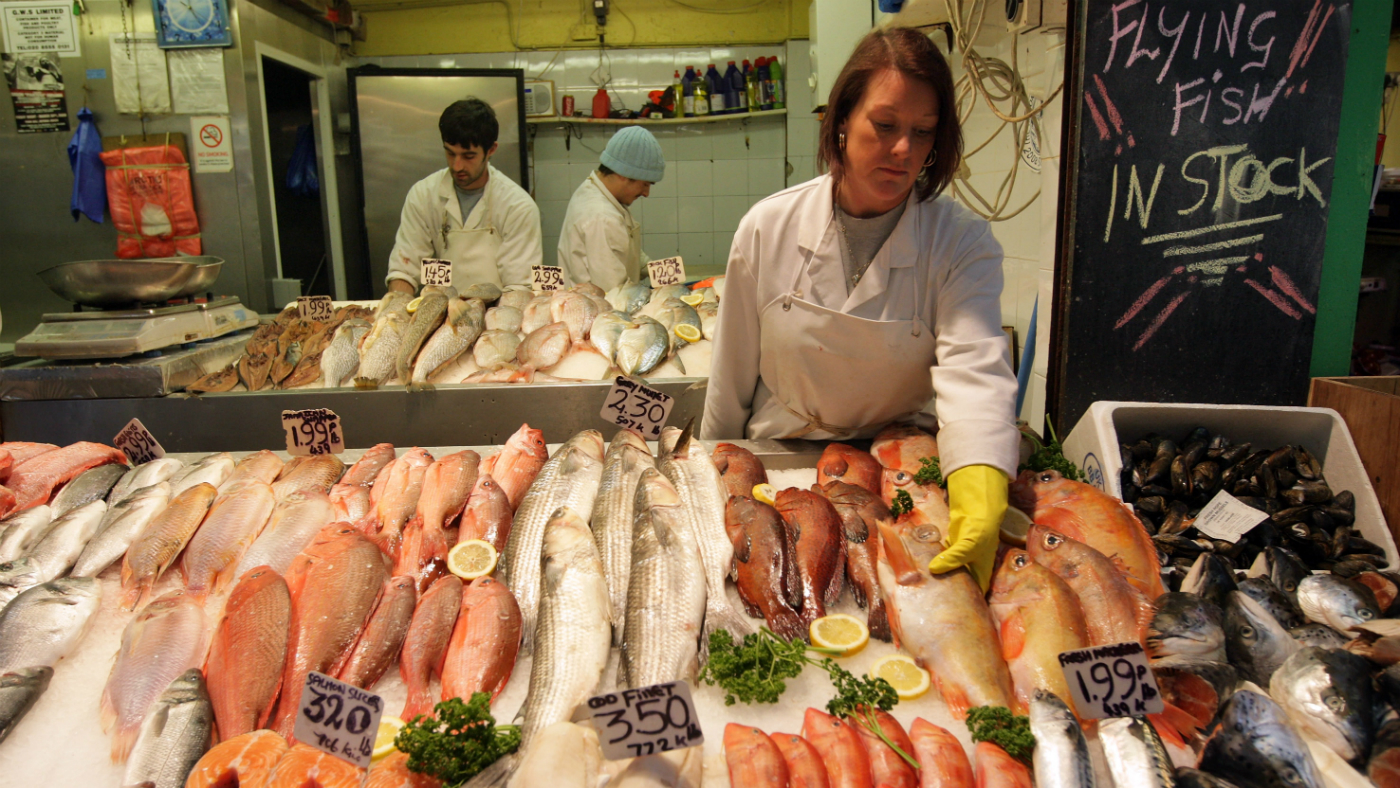Ten fish to eat to help the Brexit transition
The Good Fish Guide suggests consumers move away from cod and salmon and onto more unusual choices including hake and Dover sole

A free daily email with the biggest news stories of the day – and the best features from TheWeek.com
You are now subscribed
Your newsletter sign-up was successful
Consumers in the UK have been urged to move away from eating popular fish including cod and tuna after Brexit, instead choosing more sustainable species to help the UK fishing industry.
The Marine Conservation Society (MCS) updated its Good Fish Guide this week, which lists best and worst fish to eat in terms of sustainability, including a new “post-Brexit top 10”.
The Society says it wants consumers to wean themselves off the “big five” of cod, haddock, salmon, tuna and prawns, and instead try out fish like dab, mackerel, megrim, Dover sole and pollack.
The Week
Escape your echo chamber. Get the facts behind the news, plus analysis from multiple perspectives.

Sign up for The Week's Free Newsletters
From our morning news briefing to a weekly Good News Newsletter, get the best of The Week delivered directly to your inbox.
From our morning news briefing to a weekly Good News Newsletter, get the best of The Week delivered directly to your inbox.
The guide says that choosing from a broader range of fish “takes pressure off individual fisheries” and “encourages demand for the most sustainable and local seafood”, reducing the amount of fish exported in favour of developing UK markets, the MCS said.
“UK consumers tend to stick to their tried and tested top five – both in taste and familiarity but not always sustainability,” Good Fish Guide programme manager Bernadette Clarke said.
“Cod, tuna, salmon, haddock and prawns from the right sources are all OK, but there’s so much more to explore.
“We are currently exporting around 75% of fish caught and landed in the UK, but we’re the ninth largest importer of fish in the world with around 70% of the seafood value entering the UK fish supply chain coming from overseas. By choosing more sustainable sources and keeping it local, it will help reduce wasting wild caught fish that are discarded dead because they have less value.”
A free daily email with the biggest news stories of the day – and the best features from TheWeek.com
The MCS's post-Brexit top ten is as follows:
- Dab, seine-netted in the North Sea
- MSC (Marine Stewardship Council)-certified hake from Cornwall
- MSC-certified herring from the Irish, Celtic and North seas, south-west Ireland and the eastern English Channel
- Mackerel handlined in the south-west of England
- Megrim from the northern North Sea and west of Scotland
- British rope-grown mussels
- Brown crab from Devon inshore potting area
- Queen scallops from the Fal estuary
- Pollock handlined from the Celtic Sea
- Dover sole from the western Channel
The site also suggests that conservation-minded consumers avoid these species at risk of over-fishing:
- Eel
- Grouper
- Halibut from the Atlantic
- Blue Marlin from the Atlantic
- Mullet
- Non-certified King or Tiger Prawns
- Atlantic Salmon
- Seabass
- Common and Longnose Skate
- Bigeye and Bluefin Tuna
- Whitebait
- Wolffish
-
 Why is the Trump administration talking about ‘Western civilization’?
Why is the Trump administration talking about ‘Western civilization’?Talking Points Rubio says Europe, US bonded by religion and ancestry
-
 Quentin Deranque: a student’s death energizes the French far right
Quentin Deranque: a student’s death energizes the French far rightIN THE SPOTLIGHT Reactions to the violent killing of an ultraconservative activist offer a glimpse at the culture wars roiling France ahead of next year’s elections
-
 Secured vs. unsecured loans: how do they differ and which is better?
Secured vs. unsecured loans: how do they differ and which is better?the explainer They are distinguished by the level of risk and the inclusion of collateral
-
 How corrupt is the UK?
How corrupt is the UK?The Explainer Decline in standards ‘risks becoming a defining feature of our political culture’ as Britain falls to lowest ever score on global index
-
 The high street: Britain’s next political battleground?
The high street: Britain’s next political battleground?In the Spotlight Mass closure of shops and influx of organised crime are fuelling voter anger, and offer an opening for Reform UK
-
 Biggest political break-ups and make-ups of 2025
Biggest political break-ups and make-ups of 2025The Explainer From Trump and Musk to the UK and the EU, Christmas wouldn’t be Christmas without a round-up of the year’s relationship drama
-
 ‘The menu’s other highlights smack of the surreal’
‘The menu’s other highlights smack of the surreal’Instant Opinion Opinion, comment and editorials of the day
-
 Is a Reform-Tory pact becoming more likely?
Is a Reform-Tory pact becoming more likely?Today’s Big Question Nigel Farage’s party is ahead in the polls but still falls well short of a Commons majority, while Conservatives are still losing MPs to Reform
-
 Taking the low road: why the SNP is still standing strong
Taking the low road: why the SNP is still standing strongTalking Point Party is on track for a fifth consecutive victory in May’s Holyrood election, despite controversies and plummeting support
-
 Is Britain turning into ‘Trump’s America’?
Is Britain turning into ‘Trump’s America’?Today’s Big Question Direction of UK politics reflects influence and funding from across the pond
-
 What difference will the 'historic' UK-Germany treaty make?
What difference will the 'historic' UK-Germany treaty make?Today's Big Question Europe's two biggest economies sign first treaty since WWII, underscoring 'triangle alliance' with France amid growing Russian threat and US distance